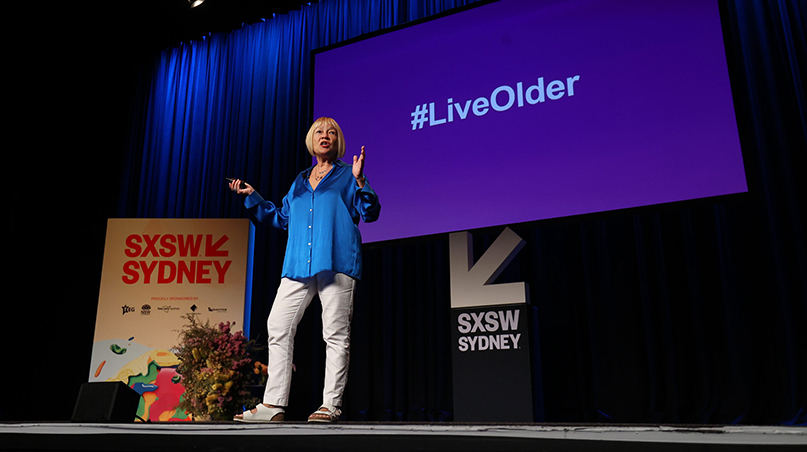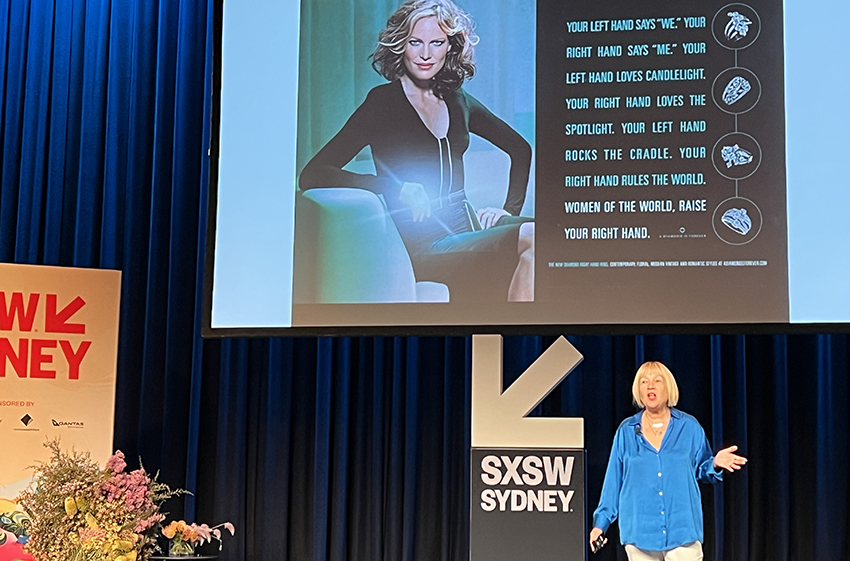‘Sex doesn’t sell, the young want to be old, and the virtues of Magic Mike marketing’ – Cindy Gallop unveils her mission to reinvent aspirational culture and make bags of money

Cindy Gallop wants everyone to love your age Pic: Brendon Thorne/Getty Images for SxSW Sydney
The self-professed Michael Bay of business, consultant and former BBH US founder wants to blow up the stereotypes and misogyny that she says have held back female leaders, house husbands and stigmatised sex. In a powerful (and at times rapturous) keynote at SxSW Sydney, Gallop argued that marketers too often fall into the trap of perpetuating cliches and stigmas established through the lens of rich, white men. She also bemoaned an industry that is beholden to the whims of “tech bros” that have banned her own ventures, MakeLoveNotPorn, from running ads across social media, and wants to inspire a new wave of role models and female leaders to embrace aspirational marketing 2.0.
The advertising industry is the modern day architect of aspiration, but the term has become shorthand for ‘affluence’, ‘elite’ and ‘luxury’, rather than simply meaning ‘to strive for something better’.
Cindy Gallop, the business consultant, speaker, entrepreneur and former advertising executive, is on a mission to reinvent ‘aspiration’, transforming it into a force for good rather than the pursuit of greed and consumerism.
Gallop has marketers in her sights as agents of change. The former founder and chair of BBH’s US business understands the power of advertising to influence cultural change as well as how it has been used to reinforce stigmas and stereotypes.
“What we do is an extraordinarily powerful force in popular culture. I want to reinvent aspirational culture, how we can do good and make money, simultaneously. Because I want to live in a world where the more good we do, the more money we make. And the more money we make, the more good we do,” she said.
“Our industry deals in stereotypes. And there's a very good practical reason for that. Because stereotypes are useful, creative shorthand. When you have only 30 seconds to communicate something, stereotypes telescope information.”
Gallop, who is known for campaigning for equality, wants to reinvent aspiration culture across five areas: relationships, age, sex, advertising and investing in startups.
Diamonds are a right hand's best friend
On the relationships front, advertising stereotypes often assume men are the breadwinners and women are housewives and nurturers, but Gallop said this isn’t the reality of modern relationships and households.
“When we hold up and celebrate the role of house husband, the role of the stay at home father, and make that aspirational for men and women alike, we change people's lives in a really fundamental way – and brands that capitalise on that can absolutely benefit from the increased emotional relevance and resonance,” she said.
It’s not just how we view relationships that need a makeover. Gallop points out that one of her favourite ads, The Right Hand Ring, a 25-year-old campaign for De Beers by J Walter Thompson, promotes diamond rings for single women by focusing on the power of the right hand, not the left (see below).

“I'm somebody with small punchy hands and short stubby fingers. I've never worn rings because I didn't think they look good. Also, I have never wanted diamonds as I’m not into jewellery. I took one look at this campaign and thought, fuck me I want a right hand ring.
“I'm showing you a 25 year old campaign because I've not seen anybody celebrate the power of the non-relationships.”
Age is 'not just a number'
Ageism is rife in advertising but Gallop believes it is not just the more mature that suffer from stigma. She takes exception to the common phrase that “age is just a number”, arguing that the opposite true and should be celebrated.
“Your age is a very special number,” the 63-year-old said. “Because your age is the sum total of you, everything you have lived to date, all of your experience and all of your learning. That's what makes you valuable.
“The mistake that I see marketers making all the time is thinking that older people want to be young. We don't. Young people want to be us because at this age we don't give a shit about what anybody thinks.”
Older people are also now powering the consumer economy, per Commbank iQ transaction data of 7 million people. The free-spending 50-plus set now have the bulk of discretionary spending dollars and are not afraid to throw them around as the younger generations, so often prized by advertisers, tighten their purse strings.
Gallop said that advertisers are doing a poor job of tapping demand from older consumers because too many marketing campaigns are created through the eyes of the younger cohort that represents the majority of adland.
“What we want to hear is from Generation Us. And you can do that by hiring, promoting and valuing older people in our industry, which as we all know, does not happen currently.”
Magic Mike marketing
Gallop also tires of the notion that “sex sells” in advertising, because it always comes from a man’s point of view.
“Sex from a male’s lens does not sell, and especially not to women,” Gallop said. “Yet it is endemic in our industry in the most ridiculous way.”
Gallop’s next suggestion sent the Pyrmont Theatre into raptures. It turns out the best way for marketers (men and women) to break free from the shackles of “sex sells” is by watching Magic Mike XXL – a sequel to the original – because the movie is a “phenomenal demonstration of sex and the female lens” that is “uplifting, moving, intimate and absolutely wonderful”.
By this stage of her keynote, it did not surprise the audience to hear that Gallop has been trying to reinvent aspirational culture around sex for the past 14 years through her online portal MakeLoveNotPorn – a user-generated, but human curated video platform that shows acts of sex.
“If porn is a Hollywood blockbuster movie, MakeLoveNotPorn is a badly needed documentary,” she said. “At Make Love Not porn, our mission ultimately is to help end rape culture globally. And we do that by doing something very simple that nobody else is doing.
"We end rape culture by showing you how wonderful, great consensual communicative sex is in the real world ... we make all of that aspirational, versus what you see in porn and popular culture.”
Gallop wants to take sex education a step further by normalising it with younger generations in an age appropriate way. But much like MakeLoveNotPorn, she has found it challenging and frustrating both to advertise and attract investment.
“We can't advertise on Facebook, Instagram, TikTok, Snapchat," she said, adding that the rules are gendered and citing several examples of women's sexual health and wellness creative that is also banned.
Make ads watchable
She is looking to build an adtech function of her user-generated platforms that embraces advertisers who produce "ads people want to see" without blanket censorship – although human checked and curated to make sure its up to scratch – a swipe at the “tech bros running social media". She would rather ads that inspire on platforms rather than dragging viewers through the digital mud of unpalatable ad formats, such as “skippable” ads and 10-second versions that force people to view content they don’t want to.
“They communicate that ads are a very bad thing," with people baited, "controlled, persuaded, tricked, deceived and blackmailed into watching it,” she said. Which is the opposite of how good advertising works. “At BBH, the agency I spent 16 years, our creative philosophy was 'we don't sell, we make people want to buy'."
Gallop also wants to shift the cultural and emotional mindset of investors to "get them to see us differently", pointing out only 1.7 per cent of VC funding is directed at female-owned businesses.
“We do that by demonstrating we can make an absolute a shit tonne of money and we do that by finding the right investors and the right backers, and the right ecosystem to help us do that," she said.
Aspirational marketing, she argues, has become too focused on selling to stereotypes when it should inspire change and attract people to a much better reality, one that can make money by understanding and embracing the power of women and other undervalued parts of society.



